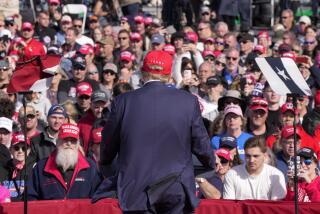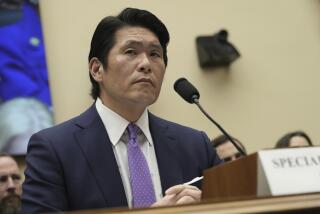White House Admits CIA Warned It Before Speech
- Share via
WASHINGTON — The Bush administration admitted for the first time Tuesday that the CIA warned senior White House officials in writing last fall that it had doubts about allegations that Iraq tried to procure uranium from Africa, a claim President Bush made in his State of the Union address three months later.
Deputy national security advisor Stephen Hadley told reporters that he received two memos from the CIA in October that cast doubt on intelligence reports that Iraq had sought to buy uranium from Niger to use in developing nuclear weapons. Hadley said Tuesday that as the White House drafted Bush’s State of the Union address in January, he did not remember reading either memo. But he said he should have, and he took the blame for the assertion’s inclusion in that speech.
“I should have recalled at the time of the State of the Union speech that there was controversy associated with the uranium issue,” Hadley told reporters in an unusual, on-the-record briefing at the White House’s Roosevelt Room.
Both memos were also sent to chief speechwriter Michael Gerson and one was sent to national security advisor Condoleezza Rice, Hadley said.
He said he did not know whether Rice read it.
The White House had previously blamed the CIA for failing to raise objections to the language in the January speech.
Hadley said that in recent days, Gerson and the CIA had uncovered two classified CIA memos that cast doubt on the uranium claim.
He said he is certain he read both memos when they were sent in advance of a speech Bush delivered in Cincinnati in October on Iraq.
The White House previously had acknowledged that, based on a verbal warning from CIA Director George J. Tenet, the claim had been removed from the Cincinnati speech.
But until Tuesday, Tenet had taken the blame for the inclusion of the assertion in Bush’s State of the Union speech as well.
“I am the senior-most official within the NSC staff directly responsible for the substantive review and clearance of presidential speeches,” Hadley said Tuesday. “The president and national security advisor look to me to ensure that the substantive statements in those speeches are the ones in which the president can have confidence. And it is now clear to me that I failed in that responsibility.”
CIA officials declined to comment on Tuesday’s revelations.
Hadley said he had already met privately to discuss the failure with Bush but declined to say whether he offered his resignation.
White House communications director Dan Bartlett insisted that Hadley had the president’s “complete confidence” and would remain on the job.
The president “accepts the explanation of his NSC staff, as well as the director of intelligence,” Bartlett said. “He is obviously not pleased when the high standards he expects to be met have not, but he has the highest level of confidence in the national security team as well as the director of intelligence.”
The White House, stung by the recent revelation that one of Bush’s arguments for launching a war against Iraq was based on questionable intelligence, has been conducting an internal inquiry into why the dubious claim made it into the State of the Union speech.
Hadley’s acceptance of the blame in effect protects Rice, his boss and one of Bush’s closest confidants, from direct responsibility for the error.
Rice has previously insisted that no high-ranking White House officials were aware of CIA doubts about the intelligence.
“No one knew at the time, in our circles -- maybe someone knew down in the bowels of the agency, but no one in our circles knew that there were doubts and suspicions that this might be a forgery,” Rice said June 8 in an interview on “Meet the Press.”
Hadley said the first of the two CIA memos was found Friday by Gerson, who was also listed as an addressee. In the memo, the CIA commented on an early draft of the Cincinnati speech and asked that the African uranium reference be removed because the agency had doubts about aspects of the claim: the amount of uranium Iraq allegedly sought.
The second CIA memo, sent to the White House situation room, said the evidence for the claim -- drawn from a British intelligence dossier -- was weak. The situation room distributed the memo to Rice and Hadley.
Hadley said, however, that in neither memo did the CIA cast doubt on the overall assessment that Iraq was seeking to acquire nuclear weapons.
Hadley said that strictly speaking, the president’s assertion -- 16 words in his State of the Union address -- remains factually accurate because it was attributed to British intelligence officials, who stand by the claim. And he insisted that the purported uranium purchase was only a small part of an “overwhelming” case that Iraqi President Saddam Hussein posed a threat to the United States.
“The real failing is that we’ve had a national discussion on 16 words, and it’s taken away from the fact that the intelligence case supporting concerns about [weapons of mass destruction] in Iraq was overwhelming,” Had- ley said.
In the end, he said, there were two breakdowns that led to the inclusion of the uranium claim in the State of the Union address: He and other White House staff members failed to remember the October memos during the drafting of the speech, and the CIA failed to bring up the issue again.
“There are a number of people who could have raised a hand, and a hand didn’t get raised,” Hadley said.
Bartlett and Hadley denied suggestions that White House officials may have discounted the CIA memos because the documents undercut an argument for attacking Iraq. They also denied that administration officials may have put so much pressure on CIA officials to back up administration claims that the agency was cowed into submission.
Bartlett said that after the Sept. 11 terrorist attacks, the administration was being accused of doing the opposite -- of failing to “connect the dots” in intelligence reports on the possible threat posed by Osama bin Laden’s Al Qaeda network.
“Now it’s the flip side, and I don’t think that’s fair,” Bartlett said. “I think there’s a relationship and a confidence level between the White House and the director of the CIA ... that if he felt there was pressure coming from the White House on intelligence matters, that he would pick up the phone and call.”
The controversy has damaged the White House at a time when the occupation of Iraq has been plagued by problems. Even as news that Hussein sons Uday and Qusai had been killed in northern Iraq, Democratic presidential hopefuls seized on the new White House admission.
Campaigning in Portsmouth, N.H., former Vermont Gov. Howard Dean called for the resignation of those White House officials responsible for failing to properly vet the uranium claim.
“It remains to be seen whether the president himself was misled, whether those around him intentionally kept the information from him, or whether the president knowingly misled the American people,” Dean said. “I sincerely hope that the latter is not the case.”
Massachusetts Sen. John F. Kerry accused the administration of continuing to “pass the buck.”
“This is a familiar story from the Bush White House. It’s more bureaucratic finger-pointing, more failures of leadership ... and more politics as usual.”
*
Times staff writers Greg Miller and Mark Z. Barabak contributed to this report.
More to Read
Sign up for Essential California
The most important California stories and recommendations in your inbox every morning.
You may occasionally receive promotional content from the Los Angeles Times.










